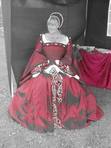Judith Arnopp's Blog, page 28
November 16, 2020
Announcing Betrayal - a FREE anthology of Short stories from your favourite Historical Fiction authors
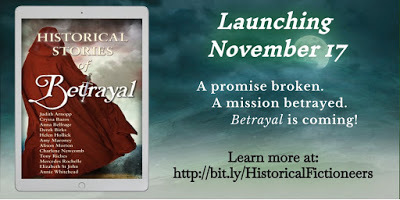
Betrayal, treachery, treason, deceit, perfidy—all names for the calculated violation of trust. And it’s been rife since humans trod the earth.
A promise broken
A mission betrayed
A lover’s desertion
A parent’s deception
An unwitting act of treason
Betrayal by comrades
Betrayal by friends
 https://books2read.com/BetrayalAnthology
https://books2read.com/BetrayalAnthologyCould you resist the forces of misplaced loyalty, power hunger, emotional blackmail, or plain greed? Is there ever redemption, or will the destruction visit future generations and even alter history? These questions are still with us today.
Twelve tales by twelve accomplished writers who explore these historical yet timeless challenges.
AD455—Roman leader Ambrosius is caught in a whirlpool of shifting allegiances
AD940—Alyeva and cleric Dunstan navigate the dangers of the Anglo Saxon court
1185—Knight Stephan fights for comradeship, duty, and honour. But what about love?
1330—The powerful Edmund of Kent enters a tangled web of intrigue
1403—Thomas Percy must decide whether to betray his sovereign or his family
1457—Estelle is invited to the King of Cyprus’s court, but deception awaits
1483—Has Elysabeth made the right decision to bring Prince Edward to London?
1484—Margaret Beaufort contemplates the path to treason
1577—Francis Drake contends with disloyalty at sea
1650—Can James Hart, Royalist highwayman, stop a nemesis destroying his friend?
1718—Pirate Annie Bonny, her lover Calico Jack, and a pirate hunter. Who will win?
1849/present—Carina must discover her ancestor’s betrayer in Italy or face ruin.
“I read this anthology from start to finish in a matter of days…. Each story is gripping.”– Discovering Diamonds Reviews
Betrayal is available as a FREE ebook on Amazon, B&N, Kobo, Apple and more FROM 17 November 2020.
November 15, 2020
Lady Estrid: A Novel of Eleventh Century Denmark

Lady Estrid: A Novel of Eleventh Century Denmark
By M J Porter
Daughter, Sister, Duchess, Aunt. Queen.
United by blood and marriage. Divided by seas. Torn apart by ambition.
Lady Estrid Sweinsdottir has returned from Kiev, her first husband dead after only a few months of marriage. Her future will be decided by her father, King Swein of Denmark, or will it?
A member of the ruling House of Gorm, Estrid might not be eligible to rule, as her older two brothers, but her worth is in more than her ability to marry and provide heirs for a husband, for her loyalty is beyond question.
With a family as divided and powerful as hers, stretching from England to Norway to the land of the Svear, she must do all she can to ensure Denmark remains under the control of her father’s descendants, no matter the raging seas and boiling ambition that threatens to imperil all.
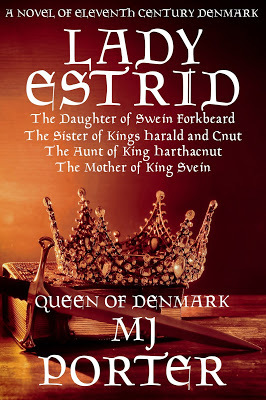
An excerpt from Lady Estrid
My sleep is disturbed, and when I wake, I’m twisted tightly around furs and pillows, and I’m drenched from head to toe in the stale odour of my body.
My chest heaves, and I reach for and then fumble the wooden beaker kept beside my bed in the event of such awakenings, the water spilling noisily onto the wooden floor. I tense, expecting Frida to rush to my side, as so often the case, but she doesn’t. Perhaps she imbibed too much wine before sleeping. I wouldn’t blame her. She rarely lets down her guard.
This true dream is different from my usual ones, the tendrils of it seeping into me, even as I shake my head, expecting it to dispel. I almost jump from my bed, pulling my abandoned cloak around my shoulders to fight the cold that seems to permeate everything, as though the coldest of nights.
A moment ago I was hotter than a flame-forged blade, but now an iciness has enveloped me, and I almost find it impossible to put weight on to my feet because they’re so chilled as I swing from my bed.
I reach for my boots, slip them over my feet, fumbling in the small light from the brazier in the corner of the room. Only then do I turn and creep from my room, the creaking door overly loud in the depths of the night, when everyone sleeps apart from the huscarls on watch duty at the main door. I don’t pity them such a cold night. I hope the brazier is piled high beside them, and that they wear thick cloaks, gloves and hats.
I tremble again, making my way silently to where I know a water jug will be waiting. In the main hall, the gloom is less, because of the embers from the massive hearth that smoulders at its centre. A few snores greet my steps but nothing else. With a shaking hand, I pour water into yet another wooden beaker and drink it desperately, hoping the water will root me firmly in my body, entirely extricating myself from the dream.
Only my eyes close involuntarily with the action of swallowing, and the scenes of my true dreams immediately reappear before my eyes. I’m gasping for breath as I seek a chair to steady myself, eyes fleeing open, hands outstretched, trying to banish the images that don’t want to leave me.
What is this?
Why is this?
I crouch further into my cloak, facing the autumn-red embers as a way of holding on to the reality of the here and now. Only then do I allow the flickers of my dream to subsume me.
I need to see what’s terrified me so much that my heart beats loudly enough that I believe they might even hear it across the sea, in Skåne.
I close my eyes, my legs and booted-feet extended toward the warmth of the fire, and then I focus on one of the images that I recall clearly.
Two bowed heads, one blond, and one auburn, and behind them, an array of others. My hands rest on those heads, and yet another blond-haired head tries to force their way between them, as they kneel before me. Behind the bent heads, eyes watch me, little more than hooded flickers of blinding white from the gloom, the only colour caused by the irises.
I don’t know where I am, only that I’m the focus of attention.
I meet the first set of eyes, noting the green tinge in the strange half-dusk, half-night light where the colours of the day are polluted by what seems to be tendrils of the hottest forge, blue and white at the centre.
But the eyes draw me in. I know those eyes.
And then another set joins those, the one pair green, the other brown. I would recognise those eyes anywhere; Cnut and Harald. Quickly, their gazes flicker to the three bowed heads before me, but my vision is filled with yet more eyes all fighting for my attention.
These I don’t know. Not at all.
There are many of them. Gazes peer from the creeping shadows, all of them focused on me. I resent the scrutiny. I don’t know all of these people. Yet I feel as though I should.
If only I could see more of them, determine who they are, and who the three dipped heads belong to as well, their faces hidden from me.
My heart thunders in my chest as I try and focus on only one set of eyes, try to recall what so frightened me that it chased me from my dreams, brought sweat to my forehead, urging me from my bed.
The first to willingly acquiesce to my scrutiny seems to shimmer as a sudden spark of light reveals more than just eyes. I have the impression of long hair, tightly braided, and a smile appears to play on tight lips, satisfaction emanating from the body.
I see the fall of rich fabric around a curvy body, reminding me of my plain figure, and I realise that those eyes focus on the one head trying to come between the two of whom I already bestow my benedictions.
I sense, rather than see, a desperate need in that look, a desire to accomplish a great deal, and also something else that surprises me so much it casts the figure back into the shadow, and I’m left swallowing the sour taste of envy.
The next eyes to truly focus on me, wash me with their superiority and rather than seeing their clothes or hair, I see only a vision of a sea teeming with warships, the cries of two embattled sides drowning out even the sound of my breathing.
I wrench my head away from the gaze, bile in my throat and my stomach rolling with more than the gait of a ship in a storm. The grey haze of the future swallows a sanctimonious smirk, and then another figure appears.
I know what this is. It’s a vision of what will happen in the future only filled with too much for me to be able to decipher.
I’ve never dreamt of so much before.
But one of those first sets of eyes draws me back, seeming to clamour for my attention.
Harald. My beloved brother. He stands apart from the other seething mass of scrutiny, I realise now, and I hold his green-tinged eyes, trying to understand his place in all this. But although his mouth moves, the sound of his words is lost to me, and I hear nothing, nothing at all, although his concern is easy to decipher. His soundless words are short and sharp, his mouth moving furiously through them all, a vision of his balled hands adding to the feeling of intense unease.
And then his eyes shift toward Cnut, and abruptly I understand so much more.
Not that I’m given the time to let him know that. Far from it.
A new shape emerges, close to Cnut, and this is someone I’ve never met before, or at least, I have no recollection of having done so.
The image of laughter suddenly ripples through the air, more substantial than sound. Yet my brother welcomes this new visitor. It seems Cnut is unaware of the bleeding knife the man covers in his hand, or even his leering glance my way. And there is the suggestion that he’s just one of many, the others all cowering behind him.
Whoever this person is, I must stay away from him, and caution Cnut to do the same. The warning is clear to see. I wish I could see more, know who this figure is.
But what of Harald? He’s gone, no longer watching me.
A rattling sound in the darkness wrenches me back to the here and now. Sweat pools down my face, and then beneath my cloak, even though I shiver.
I peer into the gloaming, trying to determine if I’m in danger, or whether it’s merely the footsteps of one of the servants come to revive the fire, or the huscarls changing positions as they guard the main door.
My gaze skims the room, seeking into the secret places, the shadowed corners where someone could hide if they needed to, but I see nothing, my eyes rimmed with the light of my dreams, making it difficult to see well.
I judder, wishing I could banish the feeling of being watched as well as the lingering fatigue of my strange dream.
A breath of air passes over my face. My eyes turn to the door, where a slim figure seems to creep through the night, even though the door has neither opened nor closed. Only, the figure is insubstantial, merely a wisp and nothing more, and when the woman looks at me, I see someone I think I recognise, but I’m not sure. Her hair is white, clumps of it missing from her head, and I know what this is, and my hands clench the arms of the chair, as though I can use them to hold on to reality.
I’m not awake. Not yet, despite what I thought.
In her wake, the wreath-like figure brings more wavering figures, all seeming to steal through the closed door.
She beckons to me, but I stay seated, wishing I could close my eyes but knowing that to do so would only bring back the other half of my dream.
What is this? Why tonight do so many visions torment me?
Behind her, the woman brings my father, and I can suddenly see the resemblance clearly, even though I never met the woman, dead before I was born. This then is my grandmother. Swein strides as though for war, a grimace on his familiar face. His beard covers his chin as always, although now it’s shadowed with grey frost.
I can see where blood pools from a wound in his side, and his face, although resolved, shows the strain in the white and blue that marbles his skin and touches his lips and eyelids. I gasp. I don’t want to see this. He’s dead. I don’t need to see the pain he was in before he took his last breathes.
And my grandmother brings more of the dead with her. I harbour a guess that the one man is my grandfather, his resemblance to my father too obvious not to remark on, although, again, I was born after his death. The great warrior, King Harald Bluetooth, killed by his son. He carries a wound as well, and the scent of rotting flesh suddenly envelopes me.
I blink, try and clear my sight, only for the eyes of my initial vision to seek me once more. I open my eyes wide, torn. Do I wish to see the dead or the living?
I swallow, rub my hands together, wishing daylight would break and the hall would fill with people, busy about their tasks. I need to be distracted from these strange hallucinations, and only the light will wholly banish the dead.
Marble hands seem to reach for my chin, and I move my head, keen not to feel the creeping flesh on me, and yet they seem to dig deep inside me. I turn aside, reach for my beaker of water, only to have my face turned aside.
My grandmother’s mouth opens, but no words pour forth, and the scent of her is disgusting. I want to gag, but I can’t, her hand holding me transfixed.
Where her eyes should be, there are bottomless pits, but I can’t turn away. The blackness of nothing beckons to me, a promise that if I follow it, all of this will disappear.
But can I? This is undoubtedly a gift, isn’t it, to step aside from my future?
Or is it a curse?
Still, the slack jaw of my grandmother tries to speak to me, but I swallow, yank my head away from her hand, trying not to hear the clatter of her dislodged finger bones falling to the floor, and I close my eyes once more.
No matter these warnings from the past, I need to see, and I need to know precisely what the future holds. I allow myself to sink back into the dream where a collection of eyes pierce me, all trying to tell me one thing, while others vie for my attention. I want to know. I need to know.
Yet, despite my brothers being there, both of them, I now see, it is to the women that my gaze turns, time and time again.
I wish I knew who the woman was, her reaching hands floating through the air, as though she means to gather as much as possible, the one bowed head most urgent of them all. I open my mouth, as though to shout a warning to my brothers, and the three heads before them, only for the woman to laugh at me, the hint of menace intensified as her hands scoop up more and more of my vision.
But she’s not alone, another woman is there as well, and all I can detect is a huge belly, as though she holds a litter of puppies inside her, and not children at all. Her hand rubs the protruding bump, and more and more of the eyes flock to her, seemingly keen to be under her command. Amongst them is the man, with the sea teeming with warships, and another, who seems to go unwillingly. And yet another, who floats eagerly toward her.
My gaze slips downwards, and I shudder, for there are no longer three bowed heads, but rather, seven, with two others squirming between them. Who are they? What are they? I can’t tell, although it seems clear to me that I’m supposed to know who they are.
And then I blink awake, Frida before me, her face pale with the lack of sleep, the worry in her eyes making me blink back tears.
Her arms are around me, rocking me gently. All of my dreams are banished, and there’s only me, and Frida, and the light of day to oust both of my nightmares.
For all that, I wish I knew who the people who inhabited my dreams were. Without such knowledge, the horrors that I’ve endured are impossible to decipher.
All the same, I take stock of what I saw; the three bowed heads, my two brothers, and eleven others as well, a woman, a man with warships and another with a bleeding knife. I hardly know who the images represent. But I vow there and then that I’ll find them all. I’ll protect my brothers.
Even if they won’t thank me for it.

Author Bio: M J Porter
I’m an author of fantasy (Viking age/dragon-themed) and historical fiction (Early English, Vikings and the British Isles as a whole before the Norman Conquest), born in the old Mercian kingdom at some point since AD1066.
I write A LOT. You’ve been warned!

November 13, 2020
A Rooster for Asklepios by Christopher D. Stanley

A Rooster for Asklepios
Marcus, a slave in the household of Lucius Coelius Felix, enjoys a better life than most slaves (and many free citizens) as the secretary and accountant of a wealthy aristocrat. His master is rising in the civic life of the Roman colony of Antioch-near-Pisidia (central Turkey), and his responsibilities and income are growing as well. If this continues, he could soon earn enough to buy his freedom, set up a small business, and even marry.
Then misfortune strikes, and his master falls into a deep depression that is exacerbated by a nagging illness that his physician is unable to cure. The future looks bleak until the physician receives a dream from the healing god Asklepios calling Lucius to travel hundreds of miles across western Asia Minor to his sanctuary at Pergamon for treatment and, he hopes, a cure.
Accompanied by Marcus and his new wife Selena, Lucius embarks on a long and eventful journey in which both master and slave encounter people and ideas that challenge long-held beliefs about themselves, their society, and the world around them. Values are questioned, loyalties tested, and identities transformed in a story that brings to life a corner of the Roman empire that has been neglected by previous storytellers.
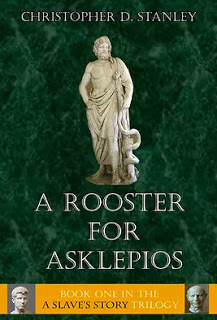
Amazon UK • Amazon US • Amazon CA • Amazon AU

A Bull For Pluto
(A Slave's Story Trilogy, Book 2)
By Christopher D. Stanley
After a lengthy and eventful stay at the sanctuary of Asklepios in Pergamon, the time has come for Lucius and Marcus to return to Antioch. Selena had been sent home earlier when Lucius learned that she was pregnant, and the impending arrival of the winter snows could soon make it impossible for them to reach their destination before the child is born.
To Marcus’s surprise, Lucius announces that he plans to stop for a while in Hierapolis to bask in the healing waters of the city’s renowned hot springs. Here Marcus meets a young woman named Miriam who challenges him to embrace his long-hidden Jewish ancestry. Marcus is torn between his budding love for Miriam and the cost of heeding her advice.
A tragic decision by Lucius seals their fate, as their full attention must now be devoted to preserving Lucius’s life. They reach Antioch in time to learn that Lucius’s son Gaius has failed miserably in his management of the household while his father was away. If Lucius should die, Marcus, Selena, and her unborn child will be at the mercy of this tyrant. To fend off this danger, Lucius must tell Marcus the full truth about his past, a truth that will ensure Marcus's future at the cost of his master's honor. Can he bring himself to act before his inevitable end?
Amazon UK • Amazon US • Amazon CA • Amazon AU
Praise for A Rooster for Asklepios and A Bull For Pluto
"This compelling and enjoyable story offers the reader a superb 'insider' view of life in the first-century Greco-Roman world. I enjoyed traipsing around Anatolia with Lucius and Marcus!"
-Dr. Terence Donaldson, Academic Dean and Professor of New Testament, Wycliffe College, Canada
"The realism of this story reflects the author's deep first-hand knowledge of the landscape and culture where the narrative takes place."
-Dr. Mark Wilson, Director, Asia Minor Research Center, Antalya, Turkey
"This well-researched book really brings the Roman world to life!"
-Dr. Alanna Nobbs, Professor of Ancient History, Macquarie University, Australia
"The amount of research, imagination, and effort involved in crafting this story earned my admiration, and stirred my curiosity, too."
Dr. Mark Nanos, Lecturer, University of Kansas, USA
Sickness and Health Care in the Roman World
Health conditions and sanitation practices in Greek and Roman cities were vastly inferior to our own, producing serious health problems and short life expectancies (by modern standards) for the bulk of their citizenry. Few authors of Roman historical fiction, however, choose to show their readers this side of ancient life.
By contrast, matters of sickness and health play a central role in my two new historical novels, A Rooster for Asklepios and A Bull for Pluto. A brief overview of the Roman health care system will provide some historical background for readers who are considering purchasing the books.
The Banality of Sickness
In Greek and Roman cities, very few people enjoyed what we would call a “comfortable middle-class lifestyle.” Income and wealth gaps were huge, and everyone except the wealthy elites and those who served them lived on the cutting edge of survival. Malnutrition was a constant threat, especially in times of famine. Sanitation was poor, even in the larger cities that benefited from Roman sewers, and waste-borne diseases were common. Public baths exposed bathers to all sorts of communicable diseases, while periodic floods spread germs over low-lying areas near bodies of water. Those at the lower end of the socioeconomic spectrum lived in dirty, crowded rooms on the upper floors of tenement buildings or in dank cellars, while the poorest residents slept in the open air on fetid sidewalks among disease-ridden pests.
Contagious illnesses spread rapidly under such conditions. At least half of all children died before their fifth birthday, and the average age of death for those who reached adulthood was around 40 for men and 35 for women. (The figure is lower for women because so many died while giving birth.) Among the poor, it would have been unusual for children to grow up with living grandparents.
Even the wealthy, however, were not immune from the threat of sickness. Unlike modern cities where the rich live in their own neighborhoods apart from the poor, people of every social level lived closely together in Greek and Roman cities. Any disease that struck the poor was likely to affect the rich as well unless they were able to escape in time to their farms in the neighboring countryside. The wealthy did enjoy healthier diets and better means of tending to their bodies, including regular exercise at the local gymnasium, and they could always afford the fees of a physician when they needed one.
But sickness and death remained a constant threat even for those at the top of the social pyramid. Wealthy citizens who had good genes, healthy lifestyles, and an ample supply of luck might live into their 60s or even 70s, but few would have reached their 80s, and most who did would have been seriously debilitated by that time.
Modes of Health Care
Every society in human history has developed mechanisms for tending and curing the sick. In modern Western societies, the bulk of the care is provided by a science-based medical system that has proved so effective that most people regard it as the default mode of treatment. In the ancient world, by contrast, medicine was only one of several competing systems of care.
For most people the first resort was self-care within the family. Common remedies included eating (or avoiding) certain types of food, taking home-made medicines, heating or cooling the body, exercise, and rest. Many treatments included the recitation of spells or incantations that were believed to enhance their effectiveness. Virtually everyone wore some type of amulet—items or substances that were thought to protect the wearer from harm—on a daily basis, and more amulets could be added to treat specific conditions. Specialists in such “magical” cures (often women) were available to assist with more stubborn cases.
Equally common were religious modes of treatment. Prayers and vows were offered to various deities to protect the household and heal the sick as part of the regular morning ritual that marked the beginning of every Roman’s day. In more serious cases, animal sacrifices and other types of offerings might be presented at the temple of a healing deity, especially the Greek god Asklepios (or Aesculapius, as he was known by the Romans). If this proved insufficient, those who could afford it might travel to a regional healing sanctuary in hopes of being visited by Asklepios in a dream either to heal them or to prescribe a treatment that would do the job.
A third mode of care was provided by physicians. Physicians occupied a fairly low position in the Greco-Roman social order—most people regarded them as more like skilled craftsmen than professionals. Many were slaves who had been bought by wealthy citizens to provide care for their households or by civic authorities to treat the general public. Some plied their skills at healing sanctuaries, either as slaves who were owned by the resident deity or as freedmen, like the physician Heracleion in my novels. Most came from Greek or native stock, even those who cared for Romans.
Medical training in the Greek world consisted of working as an apprentice to an established physician, not attending a medical school to earn a degree. Medical treatises were few and far between, so the bulk of a physician’s education came from observing, asking questions, and applying treatments to live patients. Here and there a group of medical trainees might live and study together at a healing sanctuary like the ones at Pergamon and Carura that appear in my novels, but even here their training did not include a formal curriculum or classrooms as in a modern school.
Greek medical theory was based primarily on philosophical speculation rather than scientific inquiry. Greeks viewed the body as a mixture of the four basic elements of the universe: earth, air, water, and fire. These elements were represented in the body by four “humors” or fluids that circulated throughout the body: blood, phlegm, yellow bile, and black bile. In a healthy body, the humors were properly balanced and the organs worked as designed. Sickness resulted when the humors were thrown out of balance by some type of disorder. The task of the physician was not to diagnose the cause of the imbalance but to prescribe treatments that would restore the balance of the humors, including heating, cooling, diet, medications, exercise, purging, and bleeding.
Needless to say, few of these treatments have any support from modern science. But a general awareness of how people viewed and treated illness in the ancient world will enable readers to better understand the various types of healing that Lucius pursues in the course of my stories.
Author Bio
Christopher D. Stanley is a professor at St. Bonaventure University who studies the social and religious history of Greco-Roman world, with special attention to early Christianity and Judaism. He has written or edited six books and dozens of professional articles on the subject and presents papers regularly at conferences around the world. The trilogy A Slaves Story, which grew out of historical research on first-century Asia Minor, is his first work of fiction. He is currently working on an academic book that explores healing practices in the Greco-Roman world, a subject that plays a vital role in this series.
Connect with Christopher:
Website • Facebook • Twitter • Instagram • Goodreads

November 11, 2020
Step five of The Coffee Pot Book Tour for Anke: The Beginning
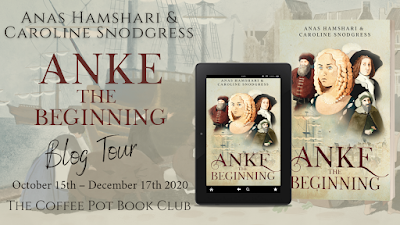
Publication Date: September 16th 2020
Publisher: Exotic Reads
Page Length: 111 eBook / 170 paperback
Genre: Historical Fiction
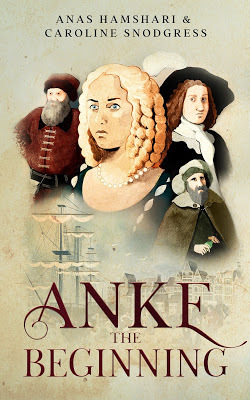
Anke: The Beginning
By Anas Hamshari and Caroline Snodgress
Living in the city of Mechelen, just south of once-prosperous Antwerp, in the aftermath of the Thirty Years’ War, Anke Verhaegen, an ambitious nineteen-year-old, is determined to make the most of her life.
When her brother Johan suggests crossing the Atlantic to New Netherland, Anke knows this is her destiny. Together, the two set about attempting to secure passage across the sea.
Before long, their plans are in motion, and hopes are high. Yet, with vengeful enemies, secrecy, and danger on the high sea waiting to be faced, will Anke really be able to secure a better life for herself?
An excerpt from Anke: The Beginning
In short, I had no interest in men. Or, at least, no interest in marriage; for, I knew that some men were interesting. Not the eligible, wealthy bachelors that Dutch fathers everywhere arranged for their daughters to marry, of course. But, there were other kinds of men. Men at the port up north, or at the market down the street, who spoke of a different kind of life. Adventure seemed to cling to them, the way the smell of smoke lingered on the skin and in clothes. I would loiter just outside the crowds of them, pretending to be interested in some limp pile of vegetables in a dilapidated market stall, and I would listen to their stories. There was such boisterous, swaggering energy about them, the way they strutted and laughed and bragged about their business ventures. Usually, I found such arrogance appalling. But, these men, it seemed, had earned it. They did not live off the wealth of their fathers or the prodigious dowries of their pretty little brides. Instead, they made their own way in the world. Everything they had, they had fought for, and had earned. My only wish was that there could be a few women about them, not merely as maids or mistresses, but as equals. That is the life I would choose for myself.
Still frustrated by my father’s scheming, I returned to the kitchen, not bothering to go to the trouble of changing again. In the little room, the heat of the oven was overpowering. After the relative coolness of the parlor, it hit me like a sickening wave as I passed through the door. When I had first begun to take on a few responsibilities in the kitchen, it had seemed so exciting. I loved the sense of responsibility and adulthood, to know that someone was putting their trust in me, and that a task, however small, depended on my hard work to be completed successfully. But, nowadays, it was merely stressful. There were plates and bowls that needed washing, cups that needed to be filled, things that needed to be bought—no matter how little money we had to spare on it. It was a hard lesson to learn that no matter how much planning and organization I implemented, my hands could only do so much work. I knew I was capable of more than this. Could I but hire a few more girls, I would delegate, and they would bustle around the kitchen, and everything would get done in time. I wanted to use my brain, wanted to lead and organize, not mindlessly chop vegetables. I greeted the flour-covered room with a look of contempt.
Fortunately, there was nothing to keep me there; our one maid had found my unfinished attempt at a pie and had tended to it. The two of us exchanged weary smiles, and I let out a breath, smoothing my hair back as best I could. The heat was unbearable. No one would miss me for an hour or two. The market was calling to me.
Buy Links:
Meet the Authors

Anas Hamshari
Anas Hamshari is an established businessman residing in the State of Kuwait, and an author of one personal growth book and two historical fiction novels. Anas has been a lifelong writer and first began creating medieval fiction tales and short stories when he was seven years old. In June 2020, Anas formed Exotic Reads, a historical fiction self-publishing division in one of his main businesses, Exotic Flavor. Exotic Reads will be self-publishing a variety of historical fiction novels in the weeks, months, and years to come.

Caroline Snodgress
Caroline Snodgress is a first-time author but a long-time writer and ghostwriter. As an Echols Scholar at the University of Virginia, she is planning to double major in English and History, and is thoroughly enjoying taking as many fiction writing classes as she can fit into her schedule. When not in Charlottesville, she lives with her family just outside of Richmond, reading eighteenth- and nineteenth-century literature and watching plenty of period dramas in her spare time.
Website • Twitter • Instagram • Facebook •
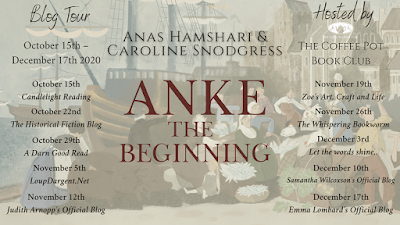
October 9, 2020
Helen Hollick chats about Alditha, wife of Harold II.
Historical Fiction Author Helen Hollick has dropped by to tell us all about Alditha, queen to Harold II, a facinating character whom I've also written about.

Alditha: Wife. Widow. Mother.
by Helen Hollick
Yes, the words of the title are in the correct order. In 1066, when Harold Godwinson, Earl of Wessex, was chosen by the council of England to become the next king after Edward the Confessor had died, he had to make a difficult choice. He had to prove to the northern earls that he would not let them down, as his younger brother, Tostig had spectacularly done. There was, on the surface, a simple way to achieve this. Take the sister of these two important earls as his wife.
The only thing that made this obvious alliance not quite so simple, was that Harold already had a common-law wife, Edyth of Nazeing, also known as Edyth Swannhæls, Edith Swanneck or Edith the Fair. But as King of England he was obliged to make a Christian-blessed marriage, and so Edyth* was set aside, and Alditha*, the sister to Edwin and Morkere, the Earls of Mercia and Northumbria, became his wife.
(*Note: there are variations regarding the spelling of these two ladies’ names – this is the spelling I use in my novel.)
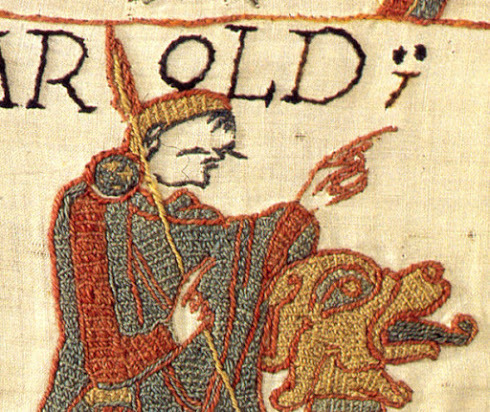
We do not know how the two women felt about all this, history rarely makes mention of the women, even the basic facts, let alone things like feelings. It does not take much imagination to assume that neither of them were particularly impressed by the decision, though.
It is probable that Edyth expected to be set aside, for when she ‘married’ Harold he was Earl of Essex, and as the years passed it was an odds-on bet that he would eventually become Earl of Wessex, which in practicality meant second-in-command beneath the king, which in turn meant the necessity of political alliance somewhere along the line. Edyth was with Harold as his ‘wife’ for over twenty years, however, and bore him at least six children. The blow when it came must have fallen hard.
Alditha was already the widow of the Welsh Prince, Gruffydd, who had been defeated by Harold in 1063. Alditha and her young daughter, Nest, were escorted back to her own family in Mercia. Nest later married the Marcher Lord Osbern fitz Richard of Richard’s castle on the Hereford/Shropshire border, which gives rise to my personal belief that after 1066 Alditha fled into Wales.
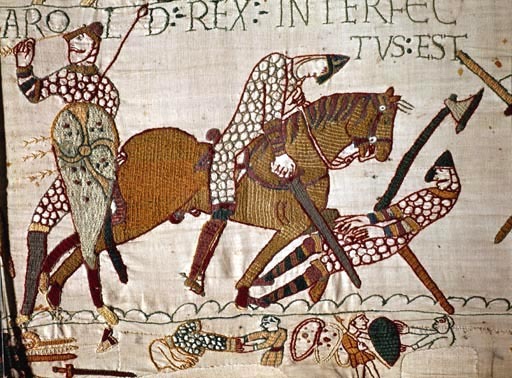
For Harold, this alliance, apart from reassuring the two northern earls, ticked all the boxes. The marriage took place soon after King Edward’s death on the 5th or 6th of January 1066, possibly occurring towards the end of January or early February – or maybe even coinciding with Harold’s coronation directly after Edward’s death. The hurry would have been to ensure the support of the North, and to provide assurance that Harold would not return the exiled Tostig to favour. It is not known whether Alditha was crowned as Queen, but it is logical that she was, in order to totally secure her brothers’ allegiance. The marriage was not to last long, for across the English Channel, Duke William of Normandy became incensed that he had not been crowned as king of England and that Harold had betrayed him. In consequence, William, having the ultimate of a hissy-fit, decided to invade England and take what he wanted by force.
On October 14th 1066, Alditha became a widow for the second time when Harold died on the battlefield at the place now known as Battle, in Sussex, seven miles inland from the coast. Alditha was pregnant. Had William managed to capture her she would have either been incarcerated within a secure nunnery or killed. Her child, were it to be a boy would have been slain. She fled, probably into Wales, her route and destination no doubt pre-arranged by Harold. Whether she stayed there or fled onward, abroad, we do not know. She did, however, give birth to a son born in late 1066 or early 1067. She named him Harold.
Her two brothers attempted rebellion against William in 1068 and again in 1069. The Norman response was a winter march across the Pennines in 1069-70 to occupy Chester and then to crush the two earls in battle near Stafford, and to devastate the north so thoroughly and terribly that it took many years to recover. Arguably, it never did.

William of Malmesbury suggests that the young Harold, as an adult, journeyed to Norway where he was well received by Olaf Haraldsson, and a Harold is found among the followers of Magnus Olafsson in 1098 when a battle was fought against the Norman earls of Shrewsbury and Chester. Thereafter, this Harold disappears from the records. But ‘Harold’ was a very common name back then, it is doubtful that this was Harold Haroldsson. It is more likely that the legitimate, and true heir to the English throne, died as a young child.
These ‘don’t knows’ of history are a delight for fiction writers, because we can make up the missing bits, add in our own thoughts, ideas and beliefs – and although others may not agree, there is no proof as to who is wrong or who is right.
I admire Edyth Swanneck, for she must have been a remarkable, loyal and loving woman, but I also admire Alditha. She never had the chance to shine, was bargained off to suit the menfolk’s needs, and then had to flee for her life. What eventually happened to her, no one knows.
I hope she eventually found comfort, peace and the love she deserved.
© Helen Hollick

Helen Hollick is the author of Harold the King (UK edition title) / I am the Chosen King (US edition title) the story of the events that led to the 1066 Battle of Hastings
Available via Helen’s Amazon Author Page:
http://viewauthor.at/HelenHollick
Website: www.helenhollick.net
Newsletter Subscription: http://tinyletter.com/HelenHollick
Main Blog: www.ofhistoryandkings.blogspot.com
Twitter: @HelenHollick
Follow The Tour
Click here for the full tour dates and stops
October 3, 2020
A Princely Lodging: the history of Sheriff Hutton Castle by Alexander Hill

In March 2020, my first academic year at the University of York, where I am currently studying a BA in History and English and Related Literature, was abruptly cut short following the outbreak of the Covid.19 pandemic. As was the case with most students, this was a personal blow. Consequently, I found that numerous exams and essays were completely cancelled, thus crucial aspects to my learning programme were permanently removed. I would not resume study until I returned to university in October.
Having now found myself in a situation in which I had more disposable time to kill, I decided to spend this wisely an embark on a short writing exercise on a topic of my choice, the goal being to retain a level of writing which would enable to be resume my next year of study with greater ease. As an avid Medievalist, I decided to write a piece on Sheriff Hutton Castle, a ruin close to where I live which, despite being mentioned in several books, is lacking any sort of recent analysis solely based on its own historical merit.

The more I read on the castle’s illustrious history, the more I found this to be unusual; indeed, the castle itself was built by the formidable Nevilles in the late 14th century, after which it passed to the Crown and thus into the possession of King Richard III. During the Wars of the Roses, many notable historical figures graced Sheriff Hutton as the country remained embroiled in brutal and bloody civil war. These included Edward, Earl of Warwick and Margaret Plantagenet – the children of George, Duke of Clarence, and Elizabeth of York who was strategically incarcerated at Sheriff Hutton on Richard’s orders after it came to light that a betrothal existed between Elizabeth and Richard’s nemesis, Henry Tudor, the future King Henry VII. There were even rumours that the former king, Edward V and his brother Richard – now remembered as the ‘princes in the tower’ were kept alive and hidden at Sheriff Hutton, although this remains a subject of ongoing debate.

Under the Tudor monarch’s Sheriff Hutton retained its royal links. In 1525, King Henry VIII sent his illegitimate son Henry Fitzroy to be raised and educated by the finest humanist scholars from Sheriff Hutton, where he was to establish his own court. Given that King Henry still lacked a legitimate male heir, it was rumoured that he was intend on naming Fitzroy his successor. Fitzroy remained at Sheriff Hutton for 4 years, where he was taught alongside Henry Howard, now regarded as one of the finest poets of the age, who, alongside Sir Thomas Wyatt, was responsible for introducing the sonnet to the English language.

During the later 16th century, plans were drawn up for a Royal Progress north, which were to include Sheriff Hutton. Thus, the arrival of Queen Elizabeth I was expected, and the gardens were restructured under the orders of Robert Dudley, who was responsible for similar renovations at Kenilworth, which was regarded as one of the ‘wonder houses’ of the age; it is possible that Sheriff Hutton was just as grand.
Nevertheless, by the turn of the century, Sheriff Hutton Castle had fallen into ruin, as the grand age of the castle drew to a close. Consequently, the walls, towers and roofs were plundered and pillaged, and little of the once mighty fortress remains. The more I read and gathered information about the history of the castle, the greater I felt a duty to retell its story, which appears to have been eclipsed by other greater fortresses, such as Middleham and Bolton. Equally, the history of Sheriff Hutton Castle is fragmented, and thus open to interpretation. This allowed for a greater creative licence, inducing me to retell the story from a unique perspective based on my own prior knowledge of the age.

Subsequently, what was initially a short essay turned into a 200-page book. As I became engrossed in my research I spent more and more time at the ruin, speaking with locals and other historians, in order to piece together an accurate portrayal of the castle’s history and its impact on the surrounding 21st century landscape. I found that it remains a staple mark upon the community, physically and metaphorically dominating the area which, although much changed, is still intrinsically tied to its regal heritage and past. This makes the lacking of any recent information on the castle all the more tragic; indeed, so little of it remains that its future is still uncertain despite the best efforts of English Heritage to preserve the remaining four towers of the inner ward which, in 2001 were near collapse.

Therefore, the aim of this book is not only to retell the story of one of Yorkshires most overlooked castles, but to encourage the restoration and preservation of our historic sites which are threatened by an ever-changing climate, which, if necessary steps are not taken to ensure their care, will be lost to us forever.

Buy Now!
Please feel free to follow my Facebook page @PrincelyLodgingBook, where I regularly update information on my work and share interesting facts about Sheriff Hutton Castle.
‘A Princely Lodging: A History of Sheriff Hutton Castle’ will be released later in 2020 is available via Feedaread, Amazon or through me directly.
September 16, 2020
Men of Harlech
Harlech castle stands proud on a rock on the edge of Snowdonia. It was raised by Edward I as part of his ring of fourteen stone strongholds to suppress and control the rebellious Welsh. Even now, some eight centuries later, the castle still reverberates with power.

By 1283 the Welsh were at last more or less conquered and Edward began to colonise the land with English. As his imposing castles went up, the native Welsh were evicted and replaced with English peasants, English tradesmen and English craftsman. Unsurprisingly Welsh resentment grew as strongly as the castles.
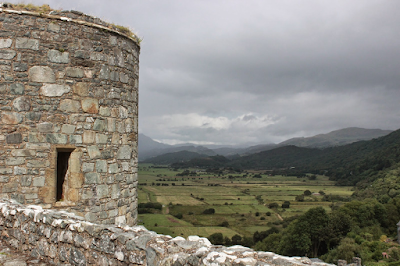
Rebellions followed, the first in 1287-8, in 1294, and another lasting from 1316-18. By the 1370’s the Welsh were still not totally vanquished but it was not until 1400 when the most serious revolt of all broke out. The leader of the revolt, Owain Glyndŵr, had previously led a conventional life, studying law at the Inns of Court in London, and serving with Richard II in France and Scotland.
In the late 1390s Glyndŵr’s neighbour, Baron Grey de Ruthyn, seized control of a parcel of land. Glyndŵr’s petition to the English parliament was ignored. In 1400 Lord Grey failed to inform Glyndŵr in time of a royal command to levy troops for Scottish border service, an act that put Glyndŵr at odds with the king. Lord Grey was a personal friend to Henry IV and Glyndŵr under no delusion as to the threat in which he stood.
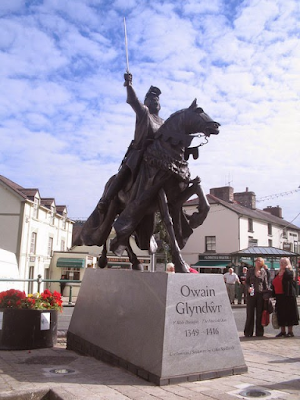
Glyndŵr, understandably fed up with the way he was treated, turned away from English authority and assumed his ancestral title of Prince of Powys. With a band of followers he launched an attack on Lord Grey’s territories.
Glyndŵr was declared an outlaw and his estates confiscated. In the years that followed the skirmishes grew into battles and outright war against the English crown. The Welsh grasped the opportunity to follow and serve a leader such as they’d been waiting for since the death of Llewellyn Fawr in 1240. Glyndŵr’s revolt spread until much of north and central Wales was in Welsh hands. The English king sent Henry ‘Hotpsur’ Percy to regain control of the country who issued an amnesty to all rebels with the exception of Glyndŵr and his cousins, Rhys and Gwilym ap Tudor.
In 1402 penal laws were issued by Parliament against Wales and the harsh anti-Welsh legislation, designed to establish English dominance, actually pushed even more Welshmen into revolt.

War is always brutal and the suffering of ordinary people is inevitable. The army burnt the towns around some of the castles to the ground and the death toll among the population was high. The battle of Stalling Down, reputedly lasting eighteen hours, resulted in defeat for the English. The English and Welsh armies met in a ravine and chronicles say that the blood was fetlock-deep.
In June the English force led by Sir Edmund Mortimer was defeated and Mortimer held hostage with Glyndŵr demanding a large sum for his safe return, but Henry refused to pay up. Mortimer retaliated against his king by forming an alliance with Glyndŵr and marrying one of his daughters.
By 1403 the revolt had spread right across Wales, and English resistance was reduced to a few isolated castles, walled towns and fortified manor houses. Welsh students at Oxford University abandoned their studies to join Glyndŵr; Welsh labourers and craftsmen resident in England abandoned their jobs and returned to Wales. Owain called on Welsh soldiers, seasoned by the English campaigns in France and Scotland, and Welsh archers and men-at-arms quit English service to offer support of their homeland. At this point Wales looked strong, the dream of an independent state within reach.
At the castles of Aberystwyth, Cricieth, Beaumaris, Caernafon and Harlech the English were caught in their own traps; the strongholds now isolated English outposts. After long sieges the castles fell into Welsh hands giving Glyndŵr control of central Wales, the run of the country.Glyndŵr moved his family into Harlech and held court there, calling his first parliament (Cynulliard – gathering of all Wales) at Machynlleth. Tradition has it that he was crowned Prince of Wales at Harlech Castle in the presence of envoys from Spain, Scotland and France. He held two other parliaments, one in Dolgellau where he signed a treaty with France.
But by 1408 the dream began to fade. Some battles were lost in the east and south and Aberystwyth Castle fell, becoming the first British castle to be assaulted by the big guns.
Harlech was under siege again. The massive curtain walls were peppered with cannon balls; one canon named ‘The King’s Daughter’ is reported to have exploded. Today the castle gatehouse displays a number of stone cannon balls which are believed to date from this time.

Ultimately Harlech was forced to surrender; Glyndŵr’s wife, daughters and grandchildren were taken prisoner. By 1410, Owain Glyndŵr was a fugitive, his dream of a free Wales shattered, his home and his family destroyed. Glyndŵr himself faded from history. It is believed his last years were spent in Herefordshire near the manor of his daughter’s husband, Sir John Scudamore. Folklore has it that a horse was kept saddled day and night in case he needed to make a quick getaway. He is believed to have died in 1416 but there is no burial site to mark his time on earth.

Today the name Owain Glyndŵr continues to resonate throughout Wales; there is hardly a town you can visit that does not bear his name, or his image. Every Welsh town, be it history or legend, has a story of Owain Glyndŵr.
There are many historical sites pertaining to the story of Owain Glyndŵr. A good starting point is the Owain Glyndŵr centre in Machynlleth: http://www.canolfanglyndwr.org/
The castles of Harlech, Aberystwyth, Beaumaris, Criccieth should not be omitted from any visit to Wales.
Photos copyright Judith Arnopp
Owain Gyndwr statue photograph: Ian West CC-BY-SA-2.0 via Wikimedia Commons
Author bio
A lifelong history enthusiast, Judith Arnopp holds an honours degree in English/Creative writing, and a Masters in Medieval Studies. Judith has written twelve novels to date. Nine of which are based in the Tudor period covering women like Elizabeth of York, Anne Boleyn and Mary Tudor but her main focus is on the perspective of historical women from all roles of life. The Beaufort Chronicle: the life of Lady Margaret Beaufort (three book series) covers the transitional period between Bosworth and the death of Henry Tudor. She is currently taking a break from Tudor women and writing from the perspective of Henry VIII himself in ‘A Matter of Conscience.’
Her books are available in paperback, kindle and some titles are available on Audible.


September 15, 2020
Cover Reveal for Betrayal: a short story collection from your favourite Historical fiction Authors
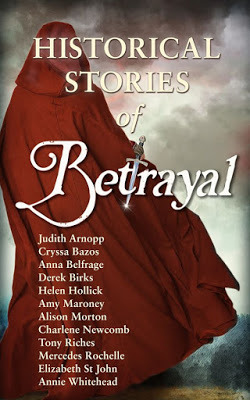
Betrayal, treachery, treason, deceit, perfidy—all names for the calculated violation of trust. And it’s been rife since humans trod the earth.
A promise broken
A mission betrayed
A lover’s desertion
A parent’s deception
An unwitting act of treason
Betrayal by comrades
Betrayal by friends
Could you resist the forces of misplaced loyalty, power hunger, emotional blackmail, or plain greed? Is there ever redemption, or will the destruction visit future generations and even alter history? These questions are still with us today.
Read twelve tales by twelve accomplished writers who explore these historical yet timeless challenges from post Roman Britain to the present day.
Amazon product page
“Loyalty breaks as easily as a silken thread.”
Misplaced trust, power hunger, emotional blackmail, and greed haunt twelve characters from post-Roman Britain to the present day. And betrayal by family, lover, or comrade can be even more devastating.
Read twelve tales by twelve accomplished writers who explore these historical yet timeless challenges.
AD 455—Roman leader Ambrosius is caught in a whirlpool of shifting allegiances
10th century—Alyeva and cleric Dunstan navigate the dangers of the Anglo Saxon court
1185—Knight Stephan fights for comradeship, duty, and honour. But what about love?
1330—The powerful Edmund of Kent enters a tangled web of intrigue
1403—Thomas Percy must decide whether to betray his sovereign or his family
1457—Estelle is invited to the King of Cyprus’s court, but deception awaits
1483—Has Elysabeth made the right decision to bring Prince Edward to London?
1484—Margaret Beaufort contemplates the path to treason
1577—Francis Drake contends with disloyalty at sea
1650—Can James Hart, Royalist highwayman, stop a nemesis destroying his friend?
1718—Pirate Annie Bonny, her lover Calico Jack, and a pirate hunter. Who will win?
1849/present—Carina must discover her ancestor’s betrayer in Italy or face ruin.
“I read this anthology from start to finish in a matter of days…. Each story is gripping.”– Discovering Diamonds Reviews
September 11, 2020
Paul Walker joins us as part of The Coffee Pot Book Club Blog Tour
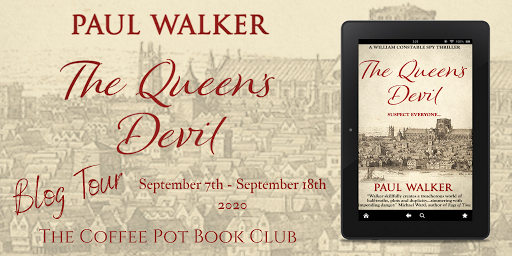
I am delighted to welcome fellow historical fiction author Paul Walker to my blog today. Paul is the author of The William Constable Spy thriller series.

The Queen’s Devil(William Constable Spy Thriller, Book #3)By Paul Walker

1583.
William Constable, recently married astrologer and mathematician, has settled into routine work as a physician when he is requested to attend two prisoners in the Tower of London. Both are accused of separate acts treason, but their backgrounds suggest there may be a connection.
Sir Francis Walsingham and Lord Burghley urge William to discover further intelligence from the prisoners while tending their injuries from torture.
The agent's investigations lead him to the French Embassy, which lies at the heart of a conspiracy which threatens the nation.
Through his enquiries, an unsuspecting William becomes entangled in a perilous web of politicking and religious fervour.
The threat comes from one the most powerful men in the English court – one referred to as the Queen’s Devil.
William faces a race against time to unpick these ties, climaxing in a daring raid on the Embassy.
Praise for Paul Walker:
“Walker skilfully creates a treacherous world of half-truths, plots and duplicity... simmering with impending danger.” Michael Ward, author of Rags of Time.
"A gripping and evocative page-turner that vibrantly brings Elizabeth's London to life." Steven Veerapen, author of A Dangerous Trade.
"Full of convincing characters both historical and imagined." Peter Tonkin
Pick up your copy for free with Kindle Unlimited subscription.
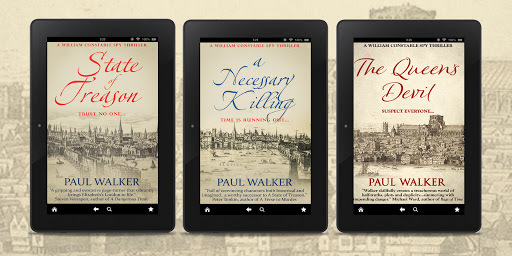
Amazon
Author Bio:
Paul Walker
Paul is married and lives in a village 30 miles north of London. Having worked in universities and run his own business, he is now a full-time writer of fiction and part-time director of an education trust. His writing in a garden shed is regularly disrupted by children and a growing number of grandchildren and dogs.
Paul writes historical fiction. He inherited his love of British history and historical fiction from his mother, who was an avid member of Richard III Society. The William Constable series of historical thrillers is based around real characters and events in the late sixteenth century. The first two books in the series - State of Treason and A Necessary Killing - were published in 2019. The third book, titled The Queen's Devil, was published in the summer of 2020.
Connect with Paul:
Twitter • Facebook • Amazon Author Page.
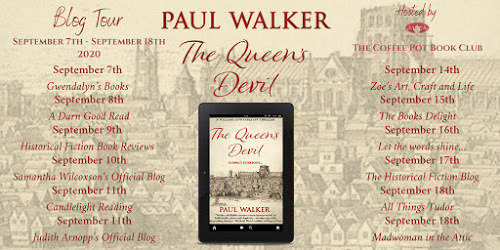
August 15, 2020
Historical Fiction Author Tony Riches is here to tell us all about his new release.

Hi Tony, thank you for agreeing to this interview. Tell us a little about yourself and your background?
Hi Judith – and thank you for inviting me. I’m a full-time historical fiction author, based in Pembrokeshire, Wales, specialising in the stories of the Tudors. I have a degree in Psychology and an MBA from Cardiff University, and previously worked as a Director of the National Health Service and a Chief Officer in Local Government.
When did you decide to become a writer?
I used to write for a range of magazines and always thought I’d like to try writing a book. My first attempt was an eBook on project management – which astounded me by becoming a best-seller in the US – and the rest is history!
Which writers inspire you?
I read widely in different genres, but my favourite authors are Hilary Mantel and C.J. Sansom. I’ve just finished Alison Weir’s new book, Katheryn Howard, The Tainted Queen and was certainly inspired by her writing.
Would you tell us about your latest book?

I’ve been planning an Elizabethan series for some time, as my aim is to tell the stories of the Tudors from Owen Tudor’s first meeting with Queen Catherine of Valois through to the death of Queen Elizabeth. I decided to show the fascinating world of the Elizabethan court through the eyes of the queen’s favourite courtiers, starting with Francis Drake. I’ve enjoyed tracking down primary sources to uncover the truth of Drake’s story – and discovering the complex man behind the myths.
Where can we buy or see it?
Drake – Tudor Corsair is available in paperback and eBook editions from:
How much research do you do?
I usually spend a year on the research for a book, and like to visit as many of the actual locations as possible. During the research for Drake – Tudor Corsair is was lucky to have a private tour of the replica Golden Hinde in London. Drake’s flagship, and the only one to survive his circumnavigation, the replica was made to the same measurements as the original, and is only 121 ft 4 in long. The visit helped with authenticity in my writing, and I realised she must have seemed vulnerable in the many storms Drake encountered.
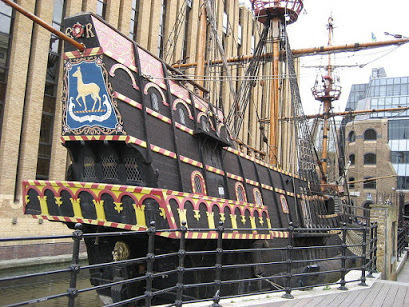
Do you have a special time to write or how is your day structured?
I used to research in the summer months, write through autumn and winter, and edit in the spring. I like to wake early and write at least 500 words before lunch – and am usually writing one book while researching the next.
Where do your ideas come from?
They say truth is stranger than fiction, and that’s certainly true with the stories of the Tudors. I spend a lot of time hunting for those little fascinating details which can bring a story to life. For example, I found that Drake wore a scarf of green silk which was a personal gift from the queen, embroidered in golden thread with: The Lord guide and preserve thee until the end. Drake believed the message was Elizabeth’s own handiwork and, with a sailor’s superstition, thought it a token of good luck.
What is the hardest thing about writing?
I am lucky to have an excellent professional editor, but must admit that revising a hundred thousand words down to ninety thousand or so can be hard work.

What was the hardest thing about writing your latest book?
I had a wealth of first-hand accounts from Drake and his crew – but all written from their own point of view, and often contradicted each other, even with the names of places and ships. Drake had to take care not to reveal that the queen’s hand was on his tiller, and even his chaplain used code names to refer to crew members.
What is the easiest thing about writing?
I immerse myself in the characters and their world, and sometimes I wake with entire passages of dialogue in my head. I have to write it down as quickly as I can, as some of my best work has been done like this.
For your own reading, do you prefer eBooks or traditional paper/hard back books?
A Kindle full of books is best for holidays, but my house is full of hard back books. I find it hard to let go of any, but I’m running out of bookshelf space, so am trying to introduce a ‘one in one out’ system.
How can readers discover more about you and you work?
The best place is my author website: https://www.tonyriches.com, which has details of all my books with links. I also have a popular blog, The Writing Desk: https://tonyriches.blogspot.comand am active on Twitter: https://twitter.com/tonyriches and Facebook: https://www.facebook.com/tonyriches.author
I’ve now had over 40,000 downloads of my Stories of the Tudors Podcasts: https://tonyriches.podbean.comand readers can also find me on -Goodreads: https://www.goodreads.com/author/show/5604088.Tony_Riches

